Reflective Journal on Clinical Nursing Practice in Aged Care
VerifiedAdded on 2023/06/08
|11
|2745
|68
Journal and Reflective Writing
AI Summary
This reflective journal explores practice-based experiences and personal development during a nursing practice in an aged care unit, utilizing Gibbs' reflective cycle. It focuses on achieving objectives related to clinical hygiene, medication administration, and workplace seniority. Key incidents include a hygiene lapse, challenges in medication adherence by a patient with throat cancer, and navigating seniority when a patient requests information. The journal analyzes feelings, evaluates actions, and proposes action plans using SMART goals and SWOT analysis to improve future practice and learning outcomes, emphasizing the importance of communication, adherence to nursing protocols, and continuous professional development. Desklib provides access to similar solved assignments and resources for students.
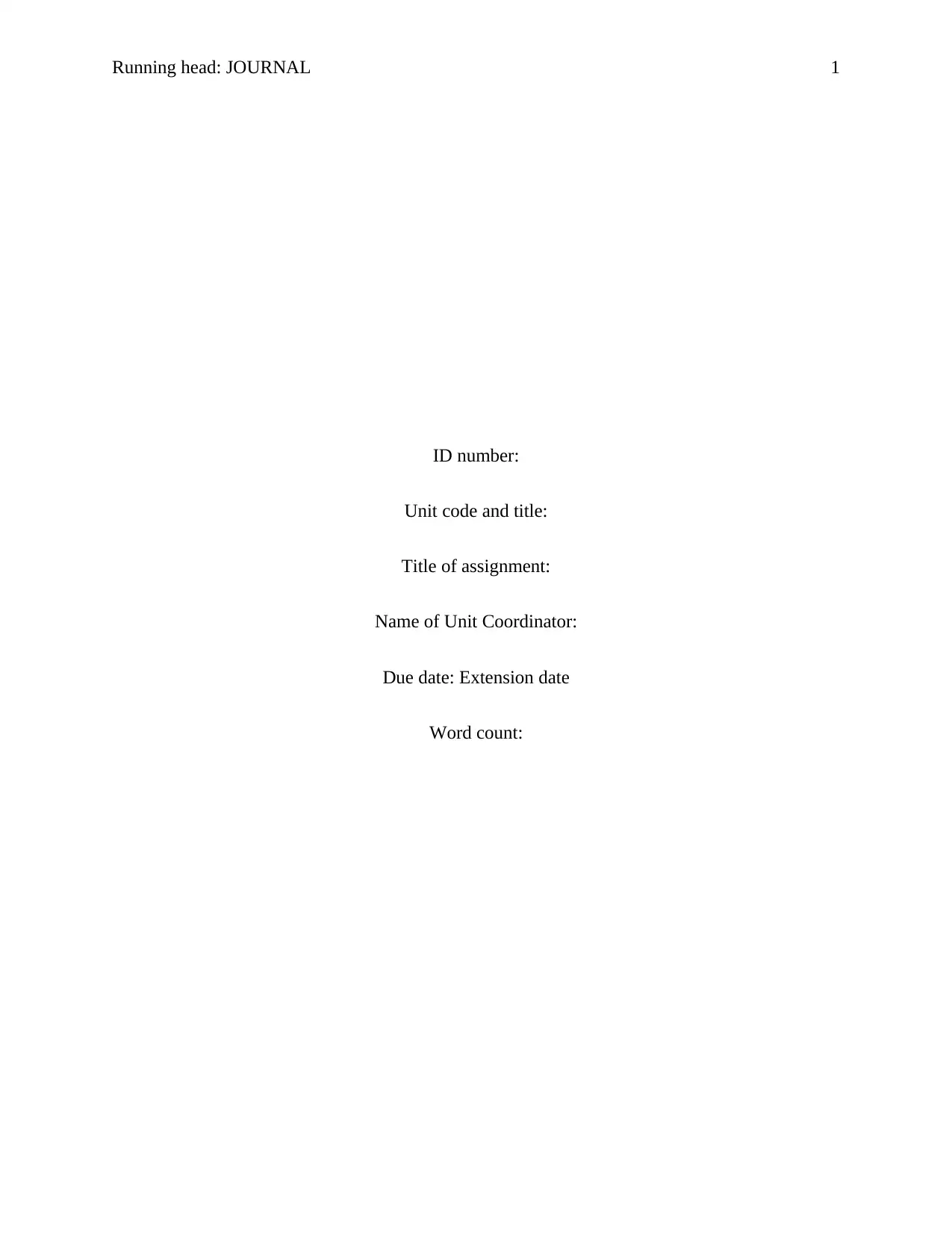
Running head: JOURNAL 1
ID number:
Unit code and title:
Title of assignment:
Name of Unit Coordinator:
Due date: Extension date
Word count:
ID number:
Unit code and title:
Title of assignment:
Name of Unit Coordinator:
Due date: Extension date
Word count:
Paraphrase This Document
Need a fresh take? Get an instant paraphrase of this document with our AI Paraphraser
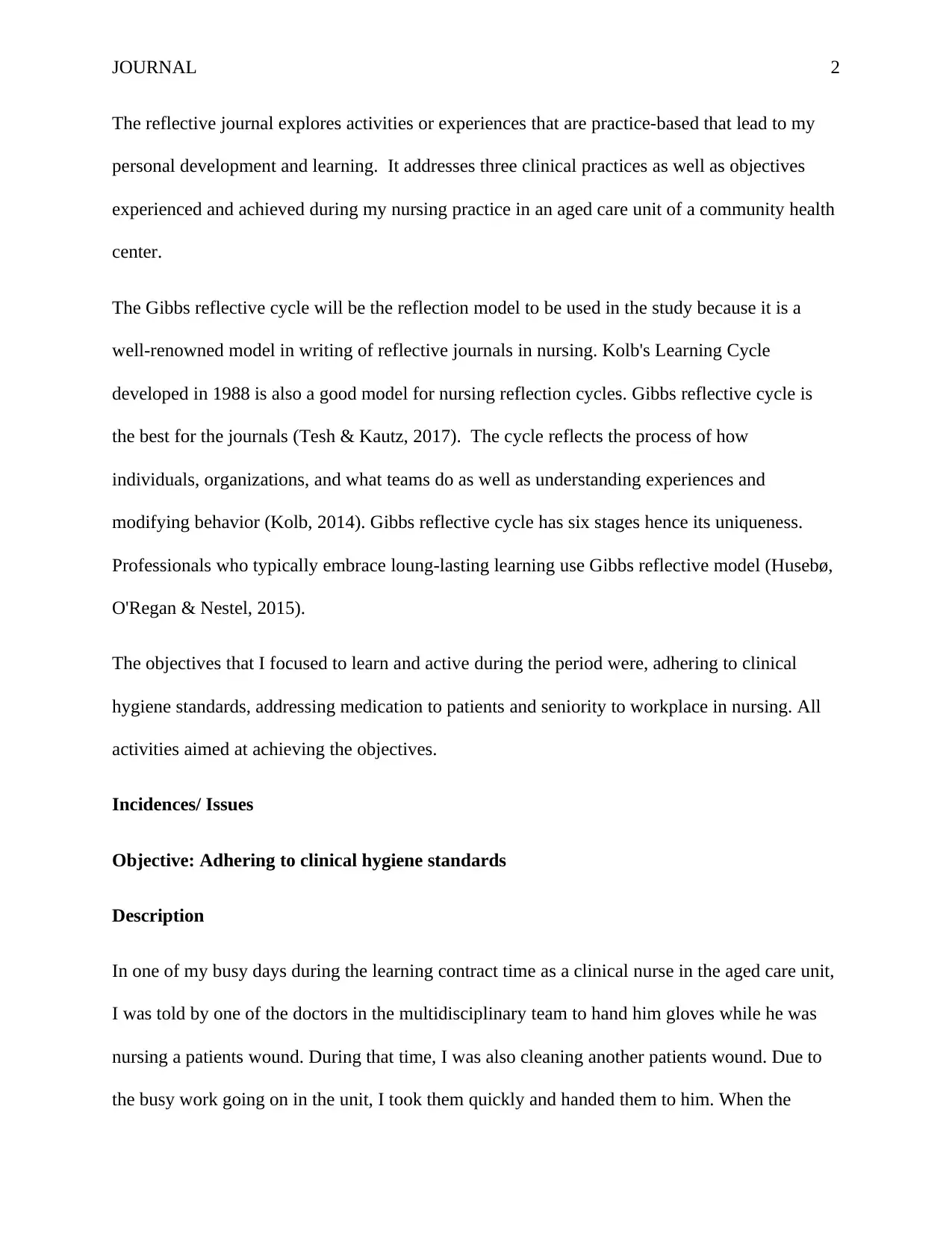
JOURNAL 2
The reflective journal explores activities or experiences that are practice-based that lead to my
personal development and learning. It addresses three clinical practices as well as objectives
experienced and achieved during my nursing practice in an aged care unit of a community health
center.
The Gibbs reflective cycle will be the reflection model to be used in the study because it is a
well-renowned model in writing of reflective journals in nursing. Kolb's Learning Cycle
developed in 1988 is also a good model for nursing reflection cycles. Gibbs reflective cycle is
the best for the journals (Tesh & Kautz, 2017). The cycle reflects the process of how
individuals, organizations, and what teams do as well as understanding experiences and
modifying behavior (Kolb, 2014). Gibbs reflective cycle has six stages hence its uniqueness.
Professionals who typically embrace loung-lasting learning use Gibbs reflective model (Husebø,
O'Regan & Nestel, 2015).
The objectives that I focused to learn and active during the period were, adhering to clinical
hygiene standards, addressing medication to patients and seniority to workplace in nursing. All
activities aimed at achieving the objectives.
Incidences/ Issues
Objective: Adhering to clinical hygiene standards
Description
In one of my busy days during the learning contract time as a clinical nurse in the aged care unit,
I was told by one of the doctors in the multidisciplinary team to hand him gloves while he was
nursing a patients wound. During that time, I was also cleaning another patients wound. Due to
the busy work going on in the unit, I took them quickly and handed them to him. When the
The reflective journal explores activities or experiences that are practice-based that lead to my
personal development and learning. It addresses three clinical practices as well as objectives
experienced and achieved during my nursing practice in an aged care unit of a community health
center.
The Gibbs reflective cycle will be the reflection model to be used in the study because it is a
well-renowned model in writing of reflective journals in nursing. Kolb's Learning Cycle
developed in 1988 is also a good model for nursing reflection cycles. Gibbs reflective cycle is
the best for the journals (Tesh & Kautz, 2017). The cycle reflects the process of how
individuals, organizations, and what teams do as well as understanding experiences and
modifying behavior (Kolb, 2014). Gibbs reflective cycle has six stages hence its uniqueness.
Professionals who typically embrace loung-lasting learning use Gibbs reflective model (Husebø,
O'Regan & Nestel, 2015).
The objectives that I focused to learn and active during the period were, adhering to clinical
hygiene standards, addressing medication to patients and seniority to workplace in nursing. All
activities aimed at achieving the objectives.
Incidences/ Issues
Objective: Adhering to clinical hygiene standards
Description
In one of my busy days during the learning contract time as a clinical nurse in the aged care unit,
I was told by one of the doctors in the multidisciplinary team to hand him gloves while he was
nursing a patients wound. During that time, I was also cleaning another patients wound. Due to
the busy work going on in the unit, I took them quickly and handed them to him. When the
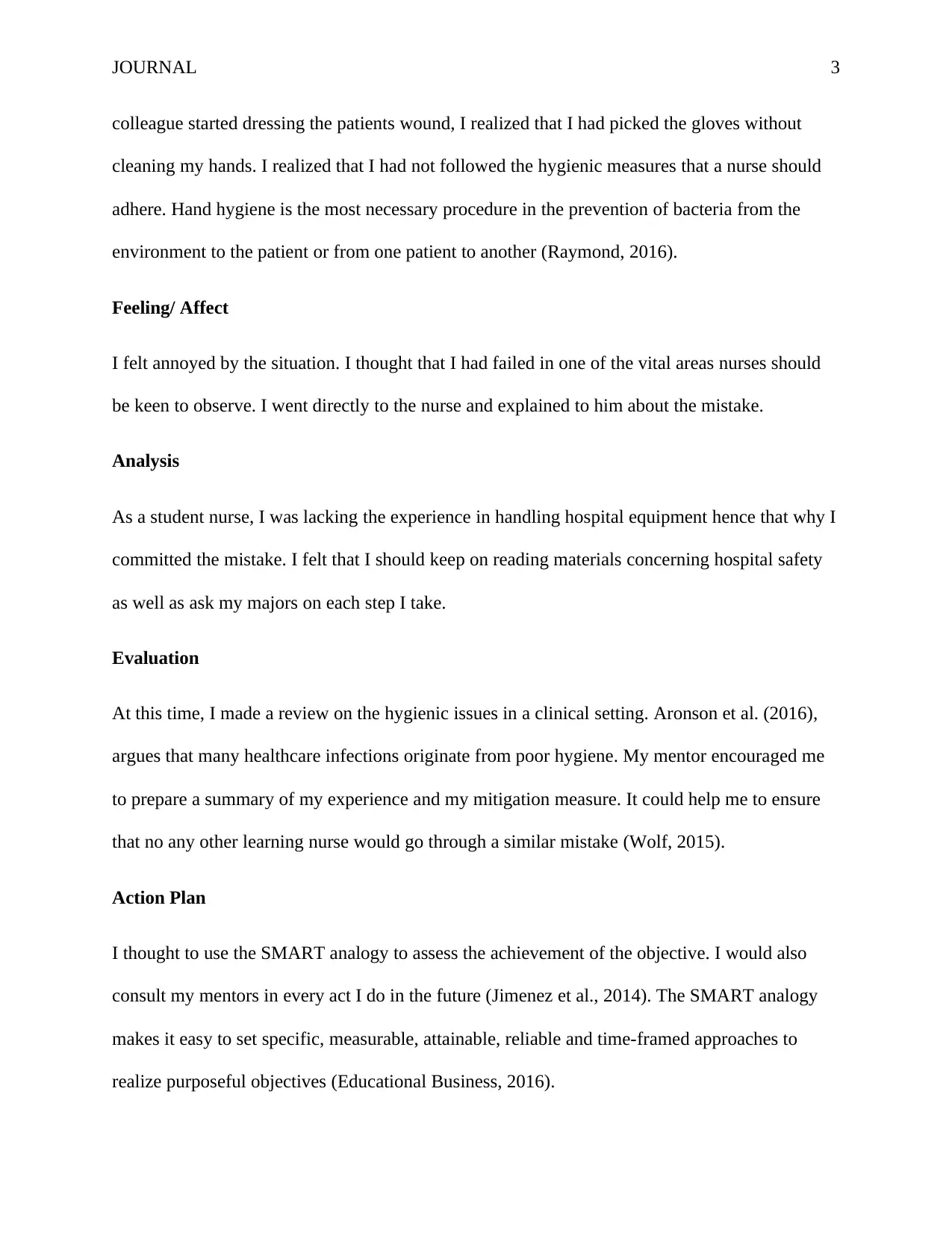
JOURNAL 3
colleague started dressing the patients wound, I realized that I had picked the gloves without
cleaning my hands. I realized that I had not followed the hygienic measures that a nurse should
adhere. Hand hygiene is the most necessary procedure in the prevention of bacteria from the
environment to the patient or from one patient to another (Raymond, 2016).
Feeling/ Affect
I felt annoyed by the situation. I thought that I had failed in one of the vital areas nurses should
be keen to observe. I went directly to the nurse and explained to him about the mistake.
Analysis
As a student nurse, I was lacking the experience in handling hospital equipment hence that why I
committed the mistake. I felt that I should keep on reading materials concerning hospital safety
as well as ask my majors on each step I take.
Evaluation
At this time, I made a review on the hygienic issues in a clinical setting. Aronson et al. (2016),
argues that many healthcare infections originate from poor hygiene. My mentor encouraged me
to prepare a summary of my experience and my mitigation measure. It could help me to ensure
that no any other learning nurse would go through a similar mistake (Wolf, 2015).
Action Plan
I thought to use the SMART analogy to assess the achievement of the objective. I would also
consult my mentors in every act I do in the future (Jimenez et al., 2014). The SMART analogy
makes it easy to set specific, measurable, attainable, reliable and time-framed approaches to
realize purposeful objectives (Educational Business, 2016).
colleague started dressing the patients wound, I realized that I had picked the gloves without
cleaning my hands. I realized that I had not followed the hygienic measures that a nurse should
adhere. Hand hygiene is the most necessary procedure in the prevention of bacteria from the
environment to the patient or from one patient to another (Raymond, 2016).
Feeling/ Affect
I felt annoyed by the situation. I thought that I had failed in one of the vital areas nurses should
be keen to observe. I went directly to the nurse and explained to him about the mistake.
Analysis
As a student nurse, I was lacking the experience in handling hospital equipment hence that why I
committed the mistake. I felt that I should keep on reading materials concerning hospital safety
as well as ask my majors on each step I take.
Evaluation
At this time, I made a review on the hygienic issues in a clinical setting. Aronson et al. (2016),
argues that many healthcare infections originate from poor hygiene. My mentor encouraged me
to prepare a summary of my experience and my mitigation measure. It could help me to ensure
that no any other learning nurse would go through a similar mistake (Wolf, 2015).
Action Plan
I thought to use the SMART analogy to assess the achievement of the objective. I would also
consult my mentors in every act I do in the future (Jimenez et al., 2014). The SMART analogy
makes it easy to set specific, measurable, attainable, reliable and time-framed approaches to
realize purposeful objectives (Educational Business, 2016).
⊘ This is a preview!⊘
Do you want full access?
Subscribe today to unlock all pages.

Trusted by 1+ million students worldwide
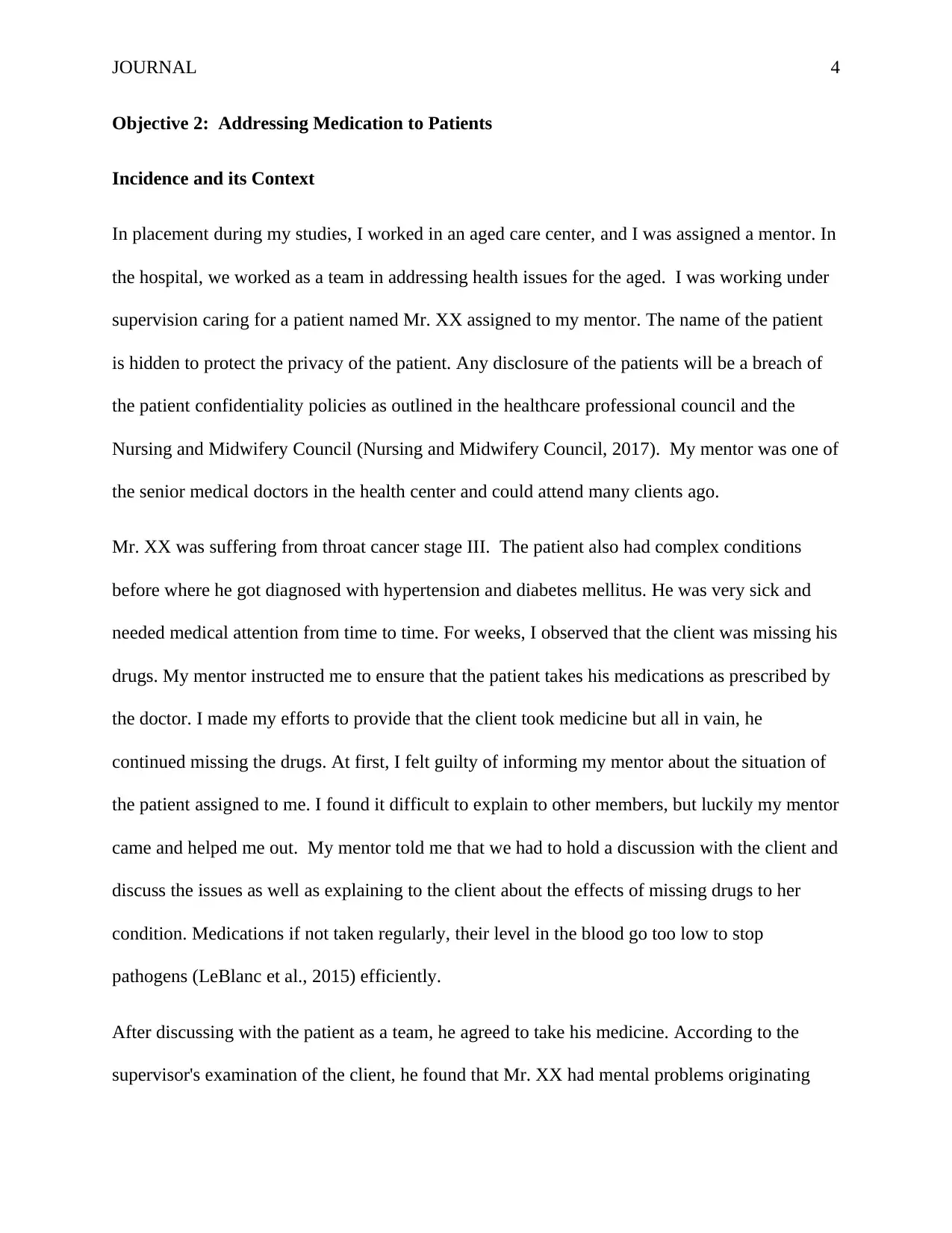
JOURNAL 4
Objective 2: Addressing Medication to Patients
Incidence and its Context
In placement during my studies, I worked in an aged care center, and I was assigned a mentor. In
the hospital, we worked as a team in addressing health issues for the aged. I was working under
supervision caring for a patient named Mr. XX assigned to my mentor. The name of the patient
is hidden to protect the privacy of the patient. Any disclosure of the patients will be a breach of
the patient confidentiality policies as outlined in the healthcare professional council and the
Nursing and Midwifery Council (Nursing and Midwifery Council, 2017). My mentor was one of
the senior medical doctors in the health center and could attend many clients ago.
Mr. XX was suffering from throat cancer stage III. The patient also had complex conditions
before where he got diagnosed with hypertension and diabetes mellitus. He was very sick and
needed medical attention from time to time. For weeks, I observed that the client was missing his
drugs. My mentor instructed me to ensure that the patient takes his medications as prescribed by
the doctor. I made my efforts to provide that the client took medicine but all in vain, he
continued missing the drugs. At first, I felt guilty of informing my mentor about the situation of
the patient assigned to me. I found it difficult to explain to other members, but luckily my mentor
came and helped me out. My mentor told me that we had to hold a discussion with the client and
discuss the issues as well as explaining to the client about the effects of missing drugs to her
condition. Medications if not taken regularly, their level in the blood go too low to stop
pathogens (LeBlanc et al., 2015) efficiently.
After discussing with the patient as a team, he agreed to take his medicine. According to the
supervisor's examination of the client, he found that Mr. XX had mental problems originating
Objective 2: Addressing Medication to Patients
Incidence and its Context
In placement during my studies, I worked in an aged care center, and I was assigned a mentor. In
the hospital, we worked as a team in addressing health issues for the aged. I was working under
supervision caring for a patient named Mr. XX assigned to my mentor. The name of the patient
is hidden to protect the privacy of the patient. Any disclosure of the patients will be a breach of
the patient confidentiality policies as outlined in the healthcare professional council and the
Nursing and Midwifery Council (Nursing and Midwifery Council, 2017). My mentor was one of
the senior medical doctors in the health center and could attend many clients ago.
Mr. XX was suffering from throat cancer stage III. The patient also had complex conditions
before where he got diagnosed with hypertension and diabetes mellitus. He was very sick and
needed medical attention from time to time. For weeks, I observed that the client was missing his
drugs. My mentor instructed me to ensure that the patient takes his medications as prescribed by
the doctor. I made my efforts to provide that the client took medicine but all in vain, he
continued missing the drugs. At first, I felt guilty of informing my mentor about the situation of
the patient assigned to me. I found it difficult to explain to other members, but luckily my mentor
came and helped me out. My mentor told me that we had to hold a discussion with the client and
discuss the issues as well as explaining to the client about the effects of missing drugs to her
condition. Medications if not taken regularly, their level in the blood go too low to stop
pathogens (LeBlanc et al., 2015) efficiently.
After discussing with the patient as a team, he agreed to take his medicine. According to the
supervisor's examination of the client, he found that Mr. XX had mental problems originating
Paraphrase This Document
Need a fresh take? Get an instant paraphrase of this document with our AI Paraphraser
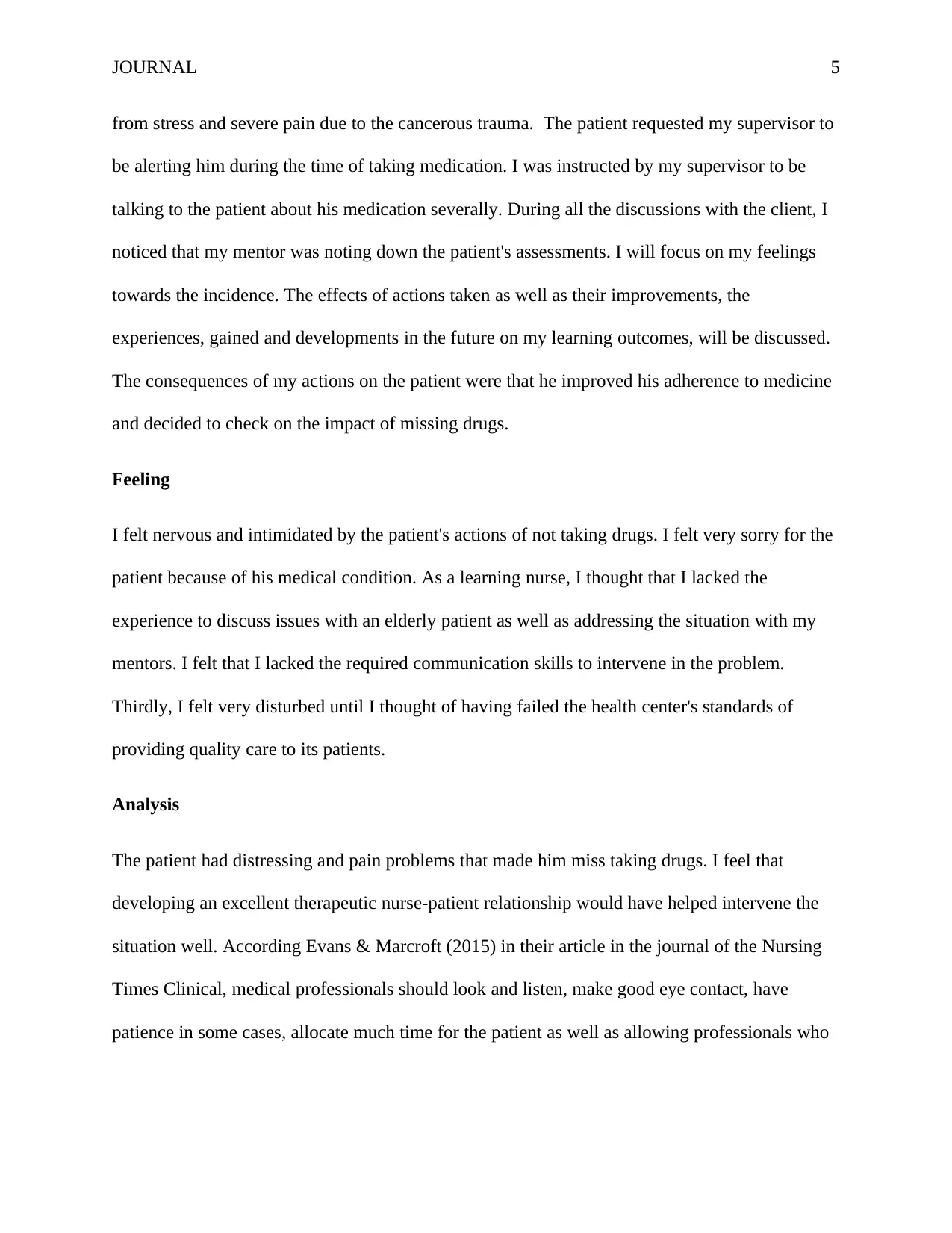
JOURNAL 5
from stress and severe pain due to the cancerous trauma. The patient requested my supervisor to
be alerting him during the time of taking medication. I was instructed by my supervisor to be
talking to the patient about his medication severally. During all the discussions with the client, I
noticed that my mentor was noting down the patient's assessments. I will focus on my feelings
towards the incidence. The effects of actions taken as well as their improvements, the
experiences, gained and developments in the future on my learning outcomes, will be discussed.
The consequences of my actions on the patient were that he improved his adherence to medicine
and decided to check on the impact of missing drugs.
Feeling
I felt nervous and intimidated by the patient's actions of not taking drugs. I felt very sorry for the
patient because of his medical condition. As a learning nurse, I thought that I lacked the
experience to discuss issues with an elderly patient as well as addressing the situation with my
mentors. I felt that I lacked the required communication skills to intervene in the problem.
Thirdly, I felt very disturbed until I thought of having failed the health center's standards of
providing quality care to its patients.
Analysis
The patient had distressing and pain problems that made him miss taking drugs. I feel that
developing an excellent therapeutic nurse-patient relationship would have helped intervene the
situation well. According Evans & Marcroft (2015) in their article in the journal of the Nursing
Times Clinical, medical professionals should look and listen, make good eye contact, have
patience in some cases, allocate much time for the patient as well as allowing professionals who
from stress and severe pain due to the cancerous trauma. The patient requested my supervisor to
be alerting him during the time of taking medication. I was instructed by my supervisor to be
talking to the patient about his medication severally. During all the discussions with the client, I
noticed that my mentor was noting down the patient's assessments. I will focus on my feelings
towards the incidence. The effects of actions taken as well as their improvements, the
experiences, gained and developments in the future on my learning outcomes, will be discussed.
The consequences of my actions on the patient were that he improved his adherence to medicine
and decided to check on the impact of missing drugs.
Feeling
I felt nervous and intimidated by the patient's actions of not taking drugs. I felt very sorry for the
patient because of his medical condition. As a learning nurse, I thought that I lacked the
experience to discuss issues with an elderly patient as well as addressing the situation with my
mentors. I felt that I lacked the required communication skills to intervene in the problem.
Thirdly, I felt very disturbed until I thought of having failed the health center's standards of
providing quality care to its patients.
Analysis
The patient had distressing and pain problems that made him miss taking drugs. I feel that
developing an excellent therapeutic nurse-patient relationship would have helped intervene the
situation well. According Evans & Marcroft (2015) in their article in the journal of the Nursing
Times Clinical, medical professionals should look and listen, make good eye contact, have
patience in some cases, allocate much time for the patient as well as allowing professionals who
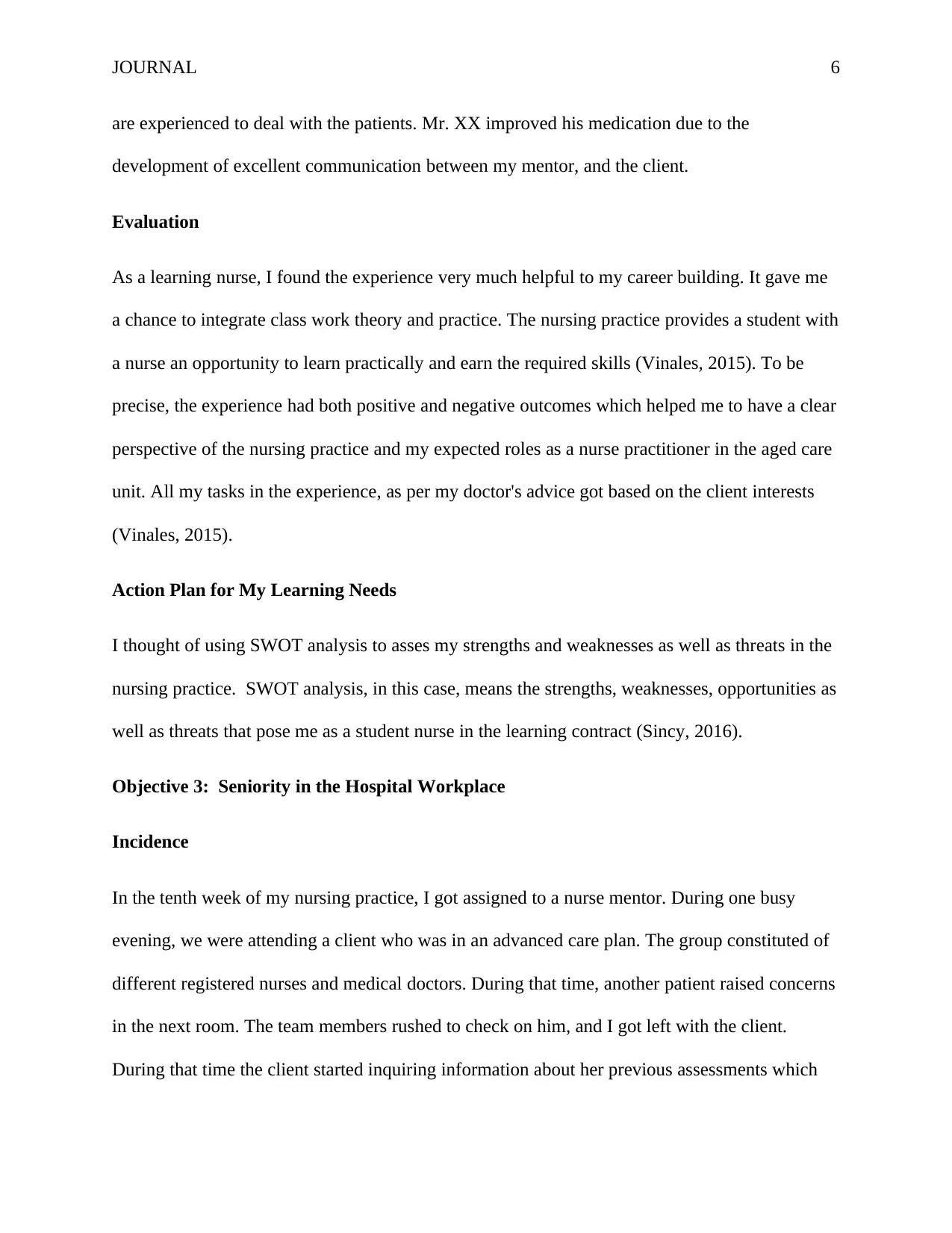
JOURNAL 6
are experienced to deal with the patients. Mr. XX improved his medication due to the
development of excellent communication between my mentor, and the client.
Evaluation
As a learning nurse, I found the experience very much helpful to my career building. It gave me
a chance to integrate class work theory and practice. The nursing practice provides a student with
a nurse an opportunity to learn practically and earn the required skills (Vinales, 2015). To be
precise, the experience had both positive and negative outcomes which helped me to have a clear
perspective of the nursing practice and my expected roles as a nurse practitioner in the aged care
unit. All my tasks in the experience, as per my doctor's advice got based on the client interests
(Vinales, 2015).
Action Plan for My Learning Needs
I thought of using SWOT analysis to asses my strengths and weaknesses as well as threats in the
nursing practice. SWOT analysis, in this case, means the strengths, weaknesses, opportunities as
well as threats that pose me as a student nurse in the learning contract (Sincy, 2016).
Objective 3: Seniority in the Hospital Workplace
Incidence
In the tenth week of my nursing practice, I got assigned to a nurse mentor. During one busy
evening, we were attending a client who was in an advanced care plan. The group constituted of
different registered nurses and medical doctors. During that time, another patient raised concerns
in the next room. The team members rushed to check on him, and I got left with the client.
During that time the client started inquiring information about her previous assessments which
are experienced to deal with the patients. Mr. XX improved his medication due to the
development of excellent communication between my mentor, and the client.
Evaluation
As a learning nurse, I found the experience very much helpful to my career building. It gave me
a chance to integrate class work theory and practice. The nursing practice provides a student with
a nurse an opportunity to learn practically and earn the required skills (Vinales, 2015). To be
precise, the experience had both positive and negative outcomes which helped me to have a clear
perspective of the nursing practice and my expected roles as a nurse practitioner in the aged care
unit. All my tasks in the experience, as per my doctor's advice got based on the client interests
(Vinales, 2015).
Action Plan for My Learning Needs
I thought of using SWOT analysis to asses my strengths and weaknesses as well as threats in the
nursing practice. SWOT analysis, in this case, means the strengths, weaknesses, opportunities as
well as threats that pose me as a student nurse in the learning contract (Sincy, 2016).
Objective 3: Seniority in the Hospital Workplace
Incidence
In the tenth week of my nursing practice, I got assigned to a nurse mentor. During one busy
evening, we were attending a client who was in an advanced care plan. The group constituted of
different registered nurses and medical doctors. During that time, another patient raised concerns
in the next room. The team members rushed to check on him, and I got left with the client.
During that time the client started inquiring information about her previous assessments which
⊘ This is a preview!⊘
Do you want full access?
Subscribe today to unlock all pages.

Trusted by 1+ million students worldwide
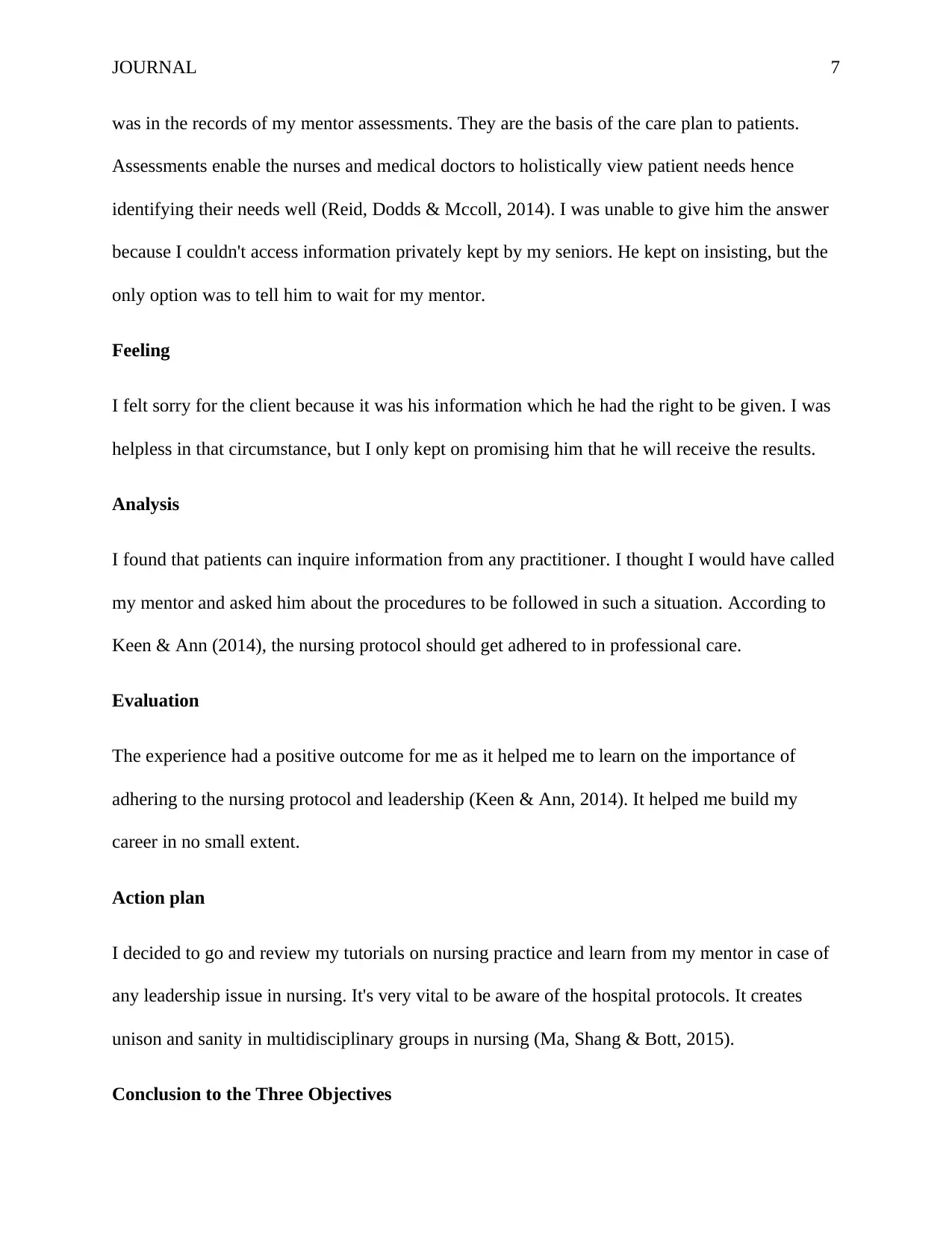
JOURNAL 7
was in the records of my mentor assessments. They are the basis of the care plan to patients.
Assessments enable the nurses and medical doctors to holistically view patient needs hence
identifying their needs well (Reid, Dodds & Mccoll, 2014). I was unable to give him the answer
because I couldn't access information privately kept by my seniors. He kept on insisting, but the
only option was to tell him to wait for my mentor.
Feeling
I felt sorry for the client because it was his information which he had the right to be given. I was
helpless in that circumstance, but I only kept on promising him that he will receive the results.
Analysis
I found that patients can inquire information from any practitioner. I thought I would have called
my mentor and asked him about the procedures to be followed in such a situation. According to
Keen & Ann (2014), the nursing protocol should get adhered to in professional care.
Evaluation
The experience had a positive outcome for me as it helped me to learn on the importance of
adhering to the nursing protocol and leadership (Keen & Ann, 2014). It helped me build my
career in no small extent.
Action plan
I decided to go and review my tutorials on nursing practice and learn from my mentor in case of
any leadership issue in nursing. It's very vital to be aware of the hospital protocols. It creates
unison and sanity in multidisciplinary groups in nursing (Ma, Shang & Bott, 2015).
Conclusion to the Three Objectives
was in the records of my mentor assessments. They are the basis of the care plan to patients.
Assessments enable the nurses and medical doctors to holistically view patient needs hence
identifying their needs well (Reid, Dodds & Mccoll, 2014). I was unable to give him the answer
because I couldn't access information privately kept by my seniors. He kept on insisting, but the
only option was to tell him to wait for my mentor.
Feeling
I felt sorry for the client because it was his information which he had the right to be given. I was
helpless in that circumstance, but I only kept on promising him that he will receive the results.
Analysis
I found that patients can inquire information from any practitioner. I thought I would have called
my mentor and asked him about the procedures to be followed in such a situation. According to
Keen & Ann (2014), the nursing protocol should get adhered to in professional care.
Evaluation
The experience had a positive outcome for me as it helped me to learn on the importance of
adhering to the nursing protocol and leadership (Keen & Ann, 2014). It helped me build my
career in no small extent.
Action plan
I decided to go and review my tutorials on nursing practice and learn from my mentor in case of
any leadership issue in nursing. It's very vital to be aware of the hospital protocols. It creates
unison and sanity in multidisciplinary groups in nursing (Ma, Shang & Bott, 2015).
Conclusion to the Three Objectives
Paraphrase This Document
Need a fresh take? Get an instant paraphrase of this document with our AI Paraphraser
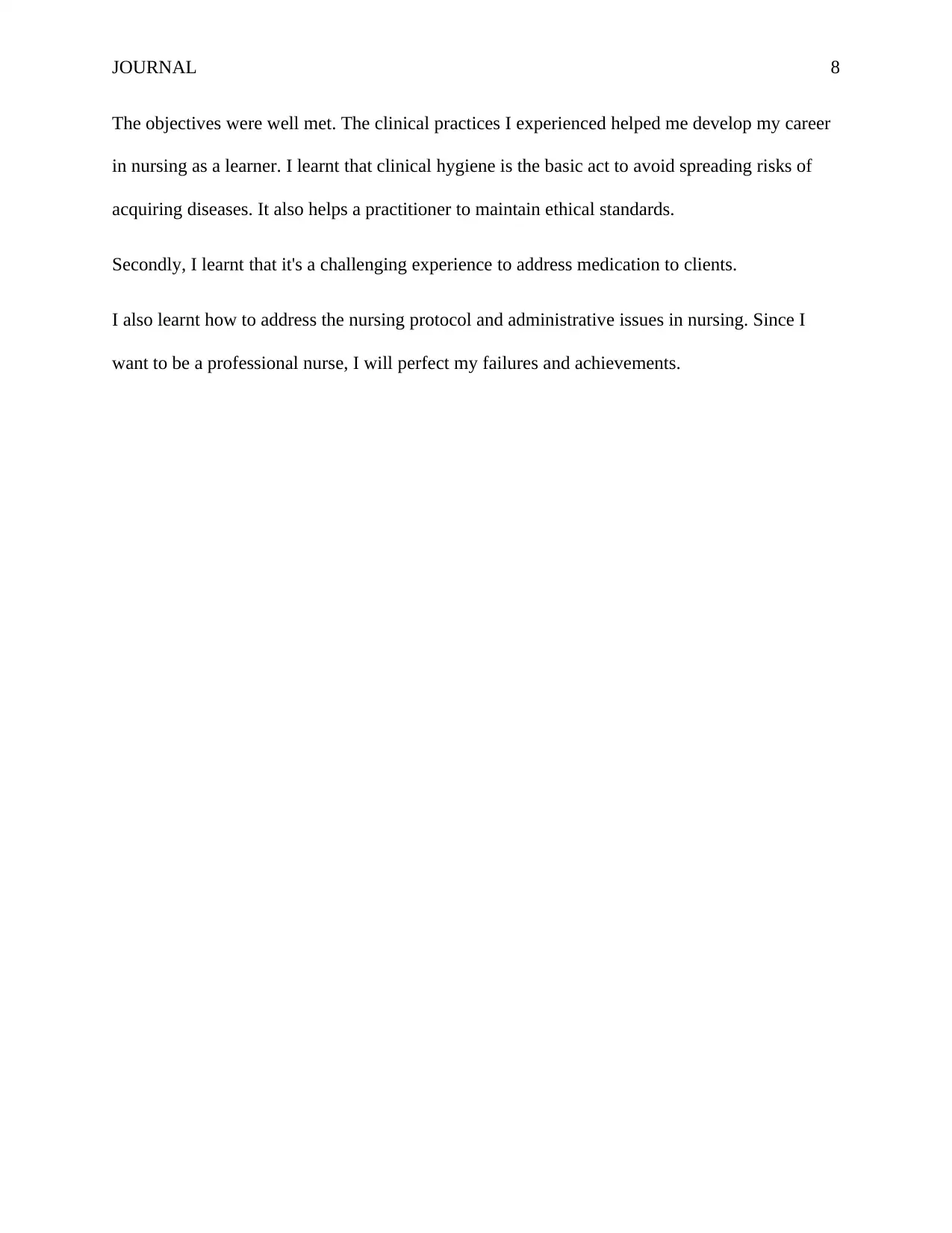
JOURNAL 8
The objectives were well met. The clinical practices I experienced helped me develop my career
in nursing as a learner. I learnt that clinical hygiene is the basic act to avoid spreading risks of
acquiring diseases. It also helps a practitioner to maintain ethical standards.
Secondly, I learnt that it's a challenging experience to address medication to clients.
I also learnt how to address the nursing protocol and administrative issues in nursing. Since I
want to be a professional nurse, I will perfect my failures and achievements.
The objectives were well met. The clinical practices I experienced helped me develop my career
in nursing as a learner. I learnt that clinical hygiene is the basic act to avoid spreading risks of
acquiring diseases. It also helps a practitioner to maintain ethical standards.
Secondly, I learnt that it's a challenging experience to address medication to clients.
I also learnt how to address the nursing protocol and administrative issues in nursing. Since I
want to be a professional nurse, I will perfect my failures and achievements.
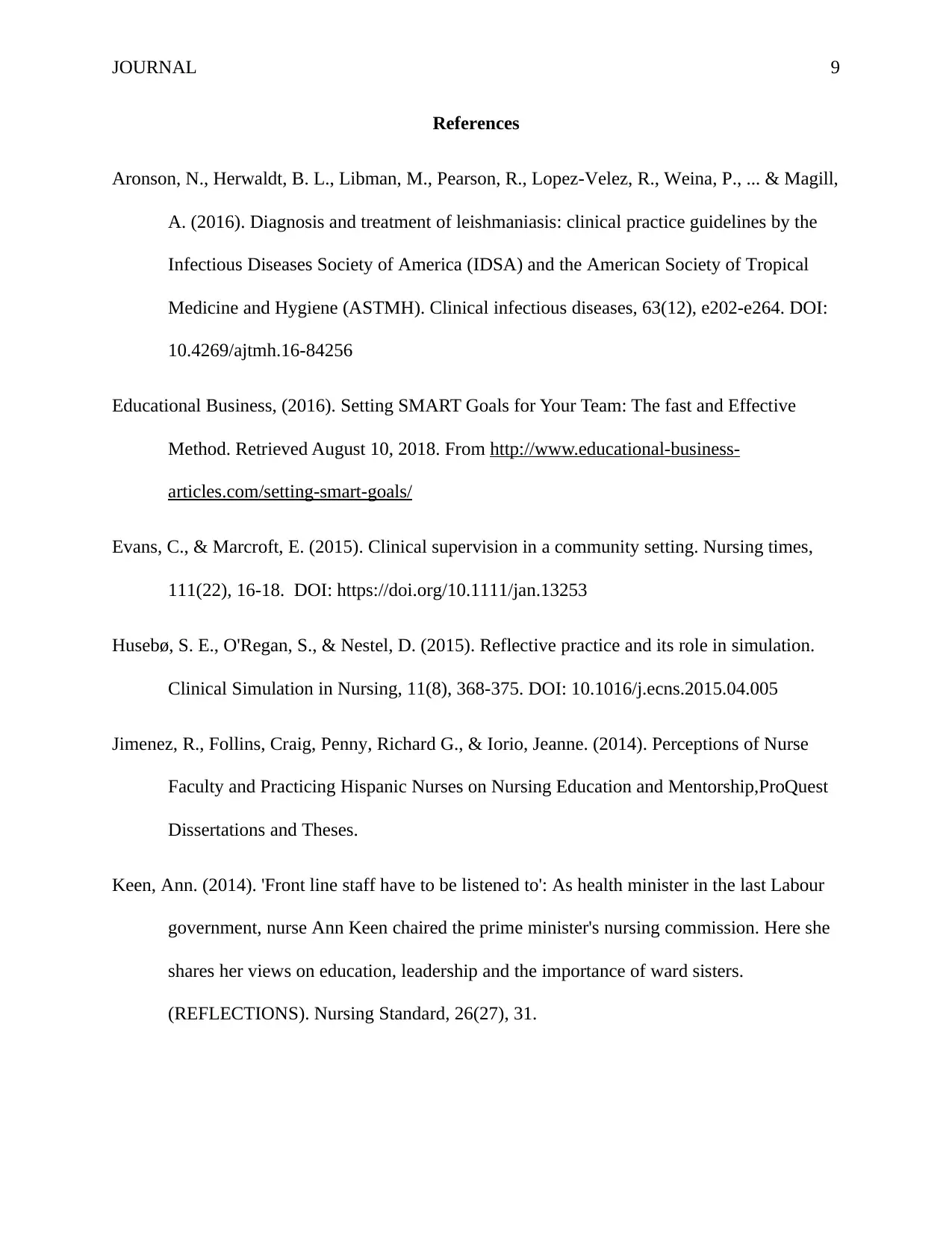
JOURNAL 9
References
Aronson, N., Herwaldt, B. L., Libman, M., Pearson, R., Lopez-Velez, R., Weina, P., ... & Magill,
A. (2016). Diagnosis and treatment of leishmaniasis: clinical practice guidelines by the
Infectious Diseases Society of America (IDSA) and the American Society of Tropical
Medicine and Hygiene (ASTMH). Clinical infectious diseases, 63(12), e202-e264. DOI:
10.4269/ajtmh.16-84256
Educational Business, (2016). Setting SMART Goals for Your Team: The fast and Effective
Method. Retrieved August 10, 2018. From http://www.educational-business-
articles.com/setting-smart-goals/
Evans, C., & Marcroft, E. (2015). Clinical supervision in a community setting. Nursing times,
111(22), 16-18. DOI: https://doi.org/10.1111/jan.13253
Husebø, S. E., O'Regan, S., & Nestel, D. (2015). Reflective practice and its role in simulation.
Clinical Simulation in Nursing, 11(8), 368-375. DOI: 10.1016/j.ecns.2015.04.005
Jimenez, R., Follins, Craig, Penny, Richard G., & Iorio, Jeanne. (2014). Perceptions of Nurse
Faculty and Practicing Hispanic Nurses on Nursing Education and Mentorship,ProQuest
Dissertations and Theses.
Keen, Ann. (2014). 'Front line staff have to be listened to': As health minister in the last Labour
government, nurse Ann Keen chaired the prime minister's nursing commission. Here she
shares her views on education, leadership and the importance of ward sisters.
(REFLECTIONS). Nursing Standard, 26(27), 31.
References
Aronson, N., Herwaldt, B. L., Libman, M., Pearson, R., Lopez-Velez, R., Weina, P., ... & Magill,
A. (2016). Diagnosis and treatment of leishmaniasis: clinical practice guidelines by the
Infectious Diseases Society of America (IDSA) and the American Society of Tropical
Medicine and Hygiene (ASTMH). Clinical infectious diseases, 63(12), e202-e264. DOI:
10.4269/ajtmh.16-84256
Educational Business, (2016). Setting SMART Goals for Your Team: The fast and Effective
Method. Retrieved August 10, 2018. From http://www.educational-business-
articles.com/setting-smart-goals/
Evans, C., & Marcroft, E. (2015). Clinical supervision in a community setting. Nursing times,
111(22), 16-18. DOI: https://doi.org/10.1111/jan.13253
Husebø, S. E., O'Regan, S., & Nestel, D. (2015). Reflective practice and its role in simulation.
Clinical Simulation in Nursing, 11(8), 368-375. DOI: 10.1016/j.ecns.2015.04.005
Jimenez, R., Follins, Craig, Penny, Richard G., & Iorio, Jeanne. (2014). Perceptions of Nurse
Faculty and Practicing Hispanic Nurses on Nursing Education and Mentorship,ProQuest
Dissertations and Theses.
Keen, Ann. (2014). 'Front line staff have to be listened to': As health minister in the last Labour
government, nurse Ann Keen chaired the prime minister's nursing commission. Here she
shares her views on education, leadership and the importance of ward sisters.
(REFLECTIONS). Nursing Standard, 26(27), 31.
⊘ This is a preview!⊘
Do you want full access?
Subscribe today to unlock all pages.

Trusted by 1+ million students worldwide
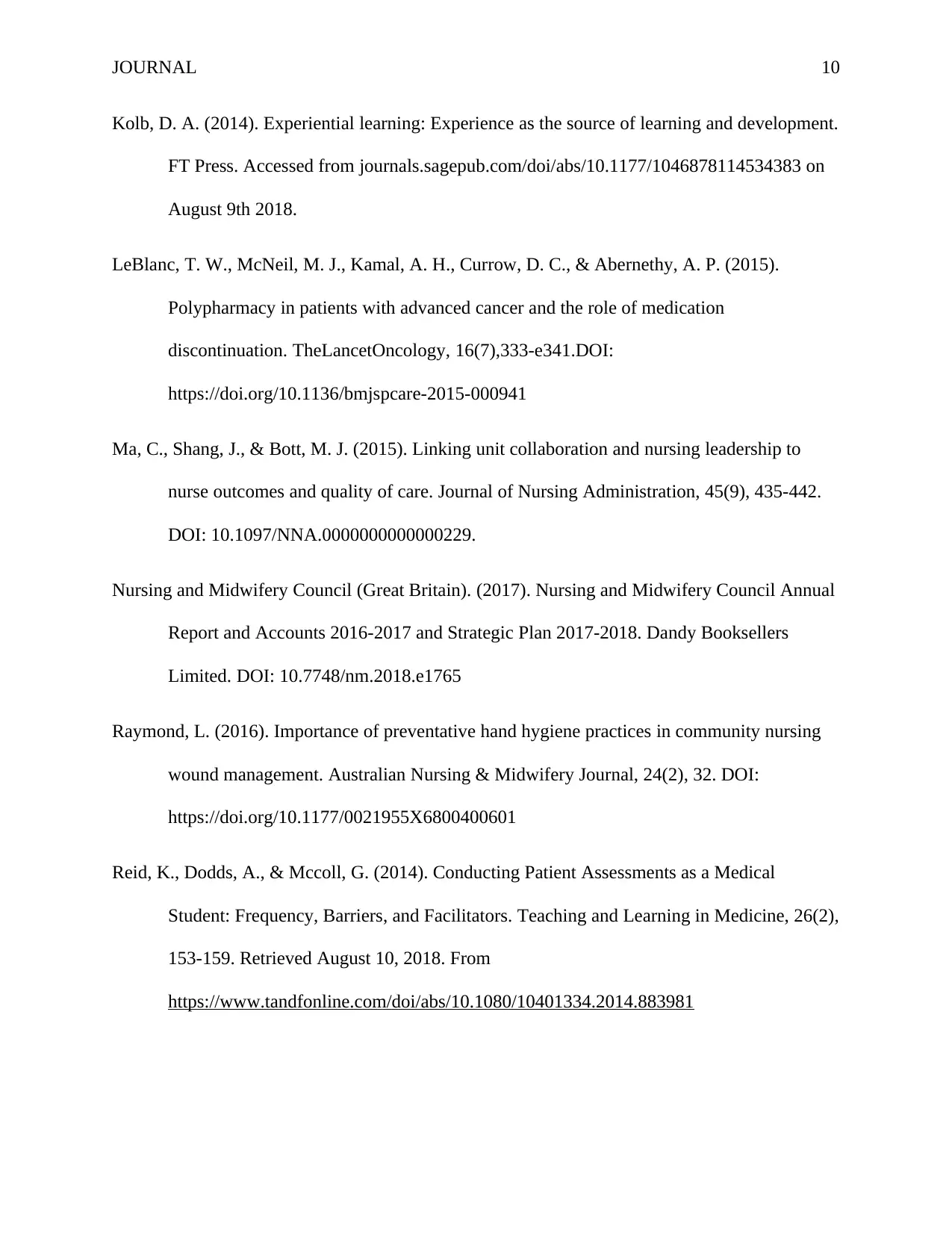
JOURNAL 10
Kolb, D. A. (2014). Experiential learning: Experience as the source of learning and development.
FT Press. Accessed from journals.sagepub.com/doi/abs/10.1177/1046878114534383 on
August 9th 2018.
LeBlanc, T. W., McNeil, M. J., Kamal, A. H., Currow, D. C., & Abernethy, A. P. (2015).
Polypharmacy in patients with advanced cancer and the role of medication
discontinuation. TheLancetOncology, 16(7),333-e341.DOI:
https://doi.org/10.1136/bmjspcare-2015-000941
Ma, C., Shang, J., & Bott, M. J. (2015). Linking unit collaboration and nursing leadership to
nurse outcomes and quality of care. Journal of Nursing Administration, 45(9), 435-442.
DOI: 10.1097/NNA.0000000000000229.
Nursing and Midwifery Council (Great Britain). (2017). Nursing and Midwifery Council Annual
Report and Accounts 2016-2017 and Strategic Plan 2017-2018. Dandy Booksellers
Limited. DOI: 10.7748/nm.2018.e1765
Raymond, L. (2016). Importance of preventative hand hygiene practices in community nursing
wound management. Australian Nursing & Midwifery Journal, 24(2), 32. DOI:
https://doi.org/10.1177/0021955X6800400601
Reid, K., Dodds, A., & Mccoll, G. (2014). Conducting Patient Assessments as a Medical
Student: Frequency, Barriers, and Facilitators. Teaching and Learning in Medicine, 26(2),
153-159. Retrieved August 10, 2018. From
https://www.tandfonline.com/doi/abs/10.1080/10401334.2014.883981
Kolb, D. A. (2014). Experiential learning: Experience as the source of learning and development.
FT Press. Accessed from journals.sagepub.com/doi/abs/10.1177/1046878114534383 on
August 9th 2018.
LeBlanc, T. W., McNeil, M. J., Kamal, A. H., Currow, D. C., & Abernethy, A. P. (2015).
Polypharmacy in patients with advanced cancer and the role of medication
discontinuation. TheLancetOncology, 16(7),333-e341.DOI:
https://doi.org/10.1136/bmjspcare-2015-000941
Ma, C., Shang, J., & Bott, M. J. (2015). Linking unit collaboration and nursing leadership to
nurse outcomes and quality of care. Journal of Nursing Administration, 45(9), 435-442.
DOI: 10.1097/NNA.0000000000000229.
Nursing and Midwifery Council (Great Britain). (2017). Nursing and Midwifery Council Annual
Report and Accounts 2016-2017 and Strategic Plan 2017-2018. Dandy Booksellers
Limited. DOI: 10.7748/nm.2018.e1765
Raymond, L. (2016). Importance of preventative hand hygiene practices in community nursing
wound management. Australian Nursing & Midwifery Journal, 24(2), 32. DOI:
https://doi.org/10.1177/0021955X6800400601
Reid, K., Dodds, A., & Mccoll, G. (2014). Conducting Patient Assessments as a Medical
Student: Frequency, Barriers, and Facilitators. Teaching and Learning in Medicine, 26(2),
153-159. Retrieved August 10, 2018. From
https://www.tandfonline.com/doi/abs/10.1080/10401334.2014.883981
Paraphrase This Document
Need a fresh take? Get an instant paraphrase of this document with our AI Paraphraser
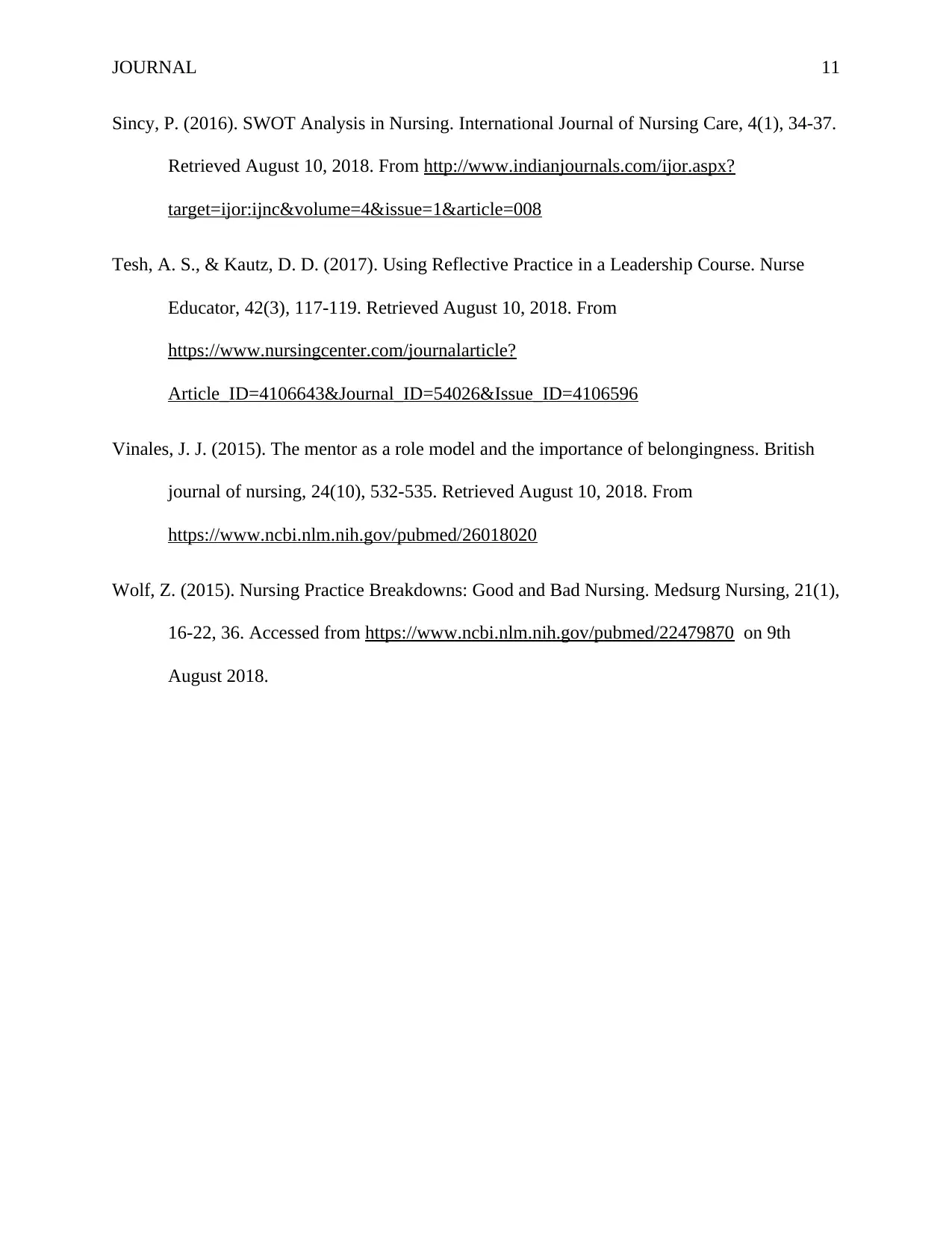
JOURNAL 11
Sincy, P. (2016). SWOT Analysis in Nursing. International Journal of Nursing Care, 4(1), 34-37.
Retrieved August 10, 2018. From http://www.indianjournals.com/ijor.aspx?
target=ijor:ijnc&volume=4&issue=1&article=008
Tesh, A. S., & Kautz, D. D. (2017). Using Reflective Practice in a Leadership Course. Nurse
Educator, 42(3), 117-119. Retrieved August 10, 2018. From
https://www.nursingcenter.com/journalarticle?
Article_ID=4106643&Journal_ID=54026&Issue_ID=4106596
Vinales, J. J. (2015). The mentor as a role model and the importance of belongingness. British
journal of nursing, 24(10), 532-535. Retrieved August 10, 2018. From
https://www.ncbi.nlm.nih.gov/pubmed/26018020
Wolf, Z. (2015). Nursing Practice Breakdowns: Good and Bad Nursing. Medsurg Nursing, 21(1),
16-22, 36. Accessed from https://www.ncbi.nlm.nih.gov/pubmed/22479870 on 9th
August 2018.
Sincy, P. (2016). SWOT Analysis in Nursing. International Journal of Nursing Care, 4(1), 34-37.
Retrieved August 10, 2018. From http://www.indianjournals.com/ijor.aspx?
target=ijor:ijnc&volume=4&issue=1&article=008
Tesh, A. S., & Kautz, D. D. (2017). Using Reflective Practice in a Leadership Course. Nurse
Educator, 42(3), 117-119. Retrieved August 10, 2018. From
https://www.nursingcenter.com/journalarticle?
Article_ID=4106643&Journal_ID=54026&Issue_ID=4106596
Vinales, J. J. (2015). The mentor as a role model and the importance of belongingness. British
journal of nursing, 24(10), 532-535. Retrieved August 10, 2018. From
https://www.ncbi.nlm.nih.gov/pubmed/26018020
Wolf, Z. (2015). Nursing Practice Breakdowns: Good and Bad Nursing. Medsurg Nursing, 21(1),
16-22, 36. Accessed from https://www.ncbi.nlm.nih.gov/pubmed/22479870 on 9th
August 2018.
1 out of 11
Related Documents
Your All-in-One AI-Powered Toolkit for Academic Success.
+13062052269
info@desklib.com
Available 24*7 on WhatsApp / Email
![[object Object]](/_next/static/media/star-bottom.7253800d.svg)
Unlock your academic potential
Copyright © 2020–2026 A2Z Services. All Rights Reserved. Developed and managed by ZUCOL.





